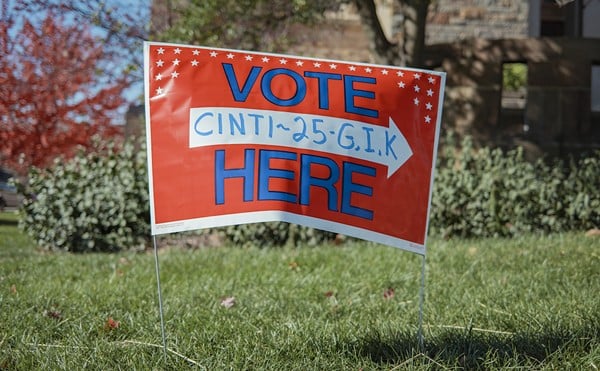|
The resistance community in Cincinnati can be described with one word, according to Ya-sin Southall, Michael Weigand and Ryan Donohue: "scattered."
The trio has decided to do something about it. During three days in October the activists plan a rally, social gathering and teach-in for all citizens working on the disparate social issues affecting the Tristate area — and the rest of the world.
"Why am I doing this?" says Weigand, a member of the International Socialist Organization. "In the hopes that people will get together to form new strategies and attain more knowledge for the purpose of diffusing power among the people of the world. So that those of us that aren't super rich can have more control over our lives and our community."
Plans call for an Oct. 3 rally on Fountain Square, followed by a party at Big Pappy's Pizzeria in Corryville. Organizers look forward to having local political bands play and are encouraging organizations to set up tables to spread their message to other activists.
"This is what I've been saying the Tristate activists needed to do for years," Weigand says. "Sitting down, sharing knowledge, networking and recruiting are at the basis of any popular movement.
This is a vehicle for all that and more."
The list of events the trio has begun organizing for Oct. 3-5 includes classes about human rights, globalization, coalition building, environmentalism and critical thinking. They are in the process of retaining experts to teach the sessions.
"We've spoken to Susan Knight from CHE (Coalition for a Humane Economy), and this organization is taking on a few of the workshops," Weigand says. "We've discussed instructors for other workshops lightly, and we hope to draw from the activist community."
Knight, director of the Sierra Club's Water Sentinels Project, has been resurrecting CHE, which focuses on "humanizing our corporate-driven economy." The organization spearheaded three days of downtown street protests against globalization of the economy in 2000 (see "You Are Here," issue of Nov. 16-22, 2000).
CHE is organizing a union bus to Miami Nov. 19-21 to protest the finalization of a resolution creating the Free Trade Area of the Americas (FTAA), an initiative similar to the North American Free Trade Agreement (NAFTA).
"The world economy has a wider gap between the rich and the poor than it ever has, and in the past 20 years we've seen this gap grow enormously," Weigand says. "This is the 21st century. We're supposed to be eliminating poverty and violence, but the people we elected to alleviate our social problems have for the most part sold us out for the sake of campaign contributions."
FTAA is a trade agreement covering all 34 countries in the Western Hemisphere except Cuba. Set to be finalized in a closed-door conference in Miami, FTAA expands the free trade agreements the United States has advocated since NAFTA passed in 1994.
The FTAA will infringe on a government's ability to create policy that protects its people, its environment and its labor rights — just as NAFTA has done since 1994, Knight says.
Canada has had many problems with lawsuits under NAFTA's chapter 11 provision, which allows a foreign-owned corporation to sue a government because of environmental or labor regulations that cost the corporation money.
"What is so strange is that if it's a foreign-owned company, they have the right to sue," Knight says.
California is also facing a NAFTA complaint from Vancouver-based Methanex Inc. because it has banned the gas-additive MTBE (methyl tertiary butyl ether). The company is seeking $970 million from the state of California.
The tribunals that decide the claims against governments are composed of NAFTA officials and industry representatives and their decisions are made in closed proceedings, Knight says.
"I think NAFTA hasn't worked," she says. "There are about a million jobs that have been reported lost in the 10 years since NAFTA was enacted."
By Jan. 1, 2002, the eight-year anniversary of NAFTA, Ohio had lost more than 14,000 jobs as a direct result of the agreement, according to Ralph Nader's organization, Public Citizen. Cincinnati alone lost nearly 800 jobs.
"In Mexico you have an estimated 5 million people on the border in the maquiladora section," Knight says. "Those jobs pay on average about $5 a day, which is not a livable wage in Mexico's terms. They didn't have money before, but they had food that they were growing that they could eat."
Under NAFTA, Knight says, farmers in Mexico have been driven off their land by corporations and have to find jobs in the maquiladora — factories where low-paid workers assemble products for export to the United States.
"To me, that is not a quality of life improvement," she says.
Weigand agrees.
"I believe that the U.S. corporate stronghold is stealing our country from us and using the wealth, prosperity and freedom associated with this country to convince us that exploiting the earth and our fellow human beings is somehow in our best interests, while really it's just the first step towards destroying what's left of the global middle class," he says. "Freedom must be defended, not by bombing places halfway around the world, but by refusing to take part in a collective surrender to greed." ©





